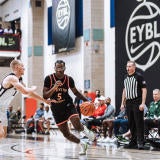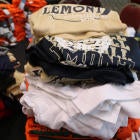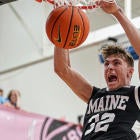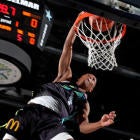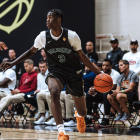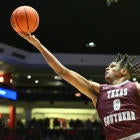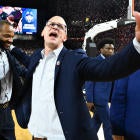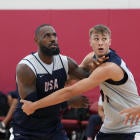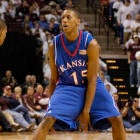A street lamp in the distance was all Kelvin Sampson had to gauge the damage and guess if, or when, his house was going to be next. Sampson, now in his fourth season as basketball coach at the University of Houston, was stranded in his home for five days while Hurricane Harvey thrashed, crippled, overtook, then inundated the city of Houston and its surrounding communities and suburbs.
Sampson found himself unexpectedly alone; his wife was grounded in North Carolina, unable to fly home before the Houston-area airports closed. (She'd eventually fly back nine days later, on Tuesday, to find her car -- along with hundreds of others at Houston's airports -- filled with water.) So Sampson was at home with only his 1-year-old puppy, Roxie. The street lamp: he would go to the window or his front door every 10 or 15 minutes to check how high the water was getting on it. Less and less of the post was showing.
"It was a foot up on the lamp, and then it was two feet, three feet, and then the water started creeping down the street toward our house," Sampson said. "Trying to describe what this has been like, just for the city of Houston, if you've never seen it before, no pun intended, it's kind of describing what the Atlantic Ocean looks like to someone who's never seen water."
Sampson hoped his home would hold -- and it did -- but he also felt helpless. He didn't have a boat, but wanted to do something to help his city. Texts from coaches came in by the hundreds. We want to help. Hang in there. Are you OK? Praying for you.
Eventually, he thought up an idea that expanded beyond anything he could have hoped for. At 2:10 p.m. local time on Aug. 28, Sampson sent this tweet, and what followed was one of the biggest charity movements in college athletics history:
#HoustonStrong #ForTheCity #GoCoogs pic.twitter.com/aAlkkcNqnE
— Coach Kelvin Sampson (@CoachSampsonUH) August 28, 2017
The tweet was seen by more than 2.58 million people. More than 1,300 donation commitments came on Twitter alone, and at this point it would not shock Sampson or anyone inside the Houston athletic department if the number of donations from individuals, teams, businesses and other groups doubles that.
College basketball has its heated rivalries, sure, but there is a support system and fraternal aspect in the college hoops community that is widespread. Sampson's tweet instantly inspired hundreds of his friends and competitors to box up as much gear as possible. Baylor coach Scott Drew, who lives in Waco, Texas, was catalyzed to donate to his in-state coaching compeer.
"I think we definitely wanted to help because we all know family, friends and loved ones in Houston," Drew said. "But it also speaks to the kind of man coach Sampson is that, during a time of crisis ... wanting to help other people and act, help those who are suffering. That's what you love about the coaching profession. You have a lot of men of action. In tough times you see coaches react to help, and that's a great thing. It makes you proud as a coach."
Sampson's well-intentioned competitive challenge went viral, and now the movement has hit the phase of feeling tangibly real on that campus. On Tuesday, the University of Houston was finally open again, for the first time in a week and a half, and able to receive mail. Nearly 400 boxes were dropped off via campus mail, UPS and FedEx. The program is expecting these cargo drops to continue for at least a week.
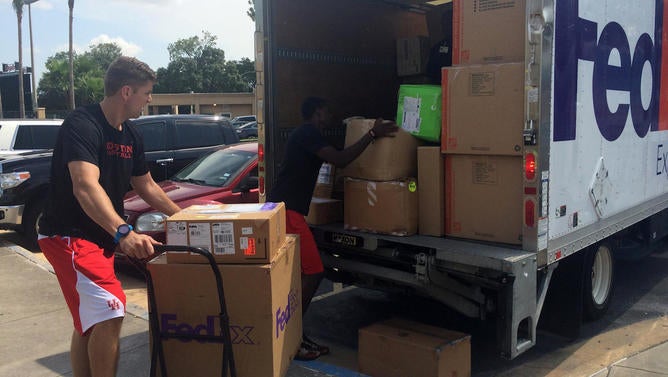
"We've gone from tennis shoes and T-shirts to diapers and phone chargers, toiletries, nice polos, sandals, shower shoes, all kinds of things," Sampson said. "We're not turning anything down. ... We're fortunate enough that we've got a place to store our stuff, and over time, we'll get every item that comes into us, we'll get it to the right spot. Whether it's Rockport, Corpus Christi to the south, or Beaumont, Port Arthur, Lake Charles to the east, or the Woodlands area to the north, we've become adept at working with government agencies, state agencies, getting this stuff out to the right people. To do that, you've got to have a great staff. My staff has been unbelievable."
Sampson's daughter, Lauren, has been the "de facto leader of the endeavor," according to her father. She and Meshu Negga, Houston's director of men's basketball operations, have helped rally approximately 25 university organizations to help unpack, sort, then re-pack the goods for future distribution. Earlier this week, Negga went to the Postal Services Distribution Center on the University of Houston campus and sent photos of the jungle of parcels that need to be distributed. This is only a fraction of the freight.
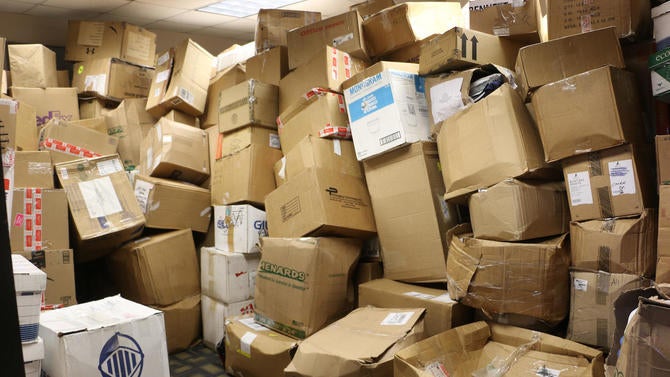
Houston has been able the house all of the boxes at its Athletics/Alumni Center. It's already starting to fill up, and there will be thousands more drop-offs throughout the coming week.
"We look like a factory," Sampson said. "We have between three and four hundred boxes so far, and are expecting 10 times that. ... We keep changing our projections, but we're going to have north of 150,000 T-shirts. You know what that means? It means we're going to be able to help a lot of people. At the end of the day...why we started this is to be able to help a lot of people."
One group Sampson and Houston can't help? High schoolers. At least not directly. NCAA compliance bylaws prevent the university from gifting potential student-athletes with items, even in times of natural disasters. It's not known for certain whether or not Houston would actually come under NCAA review and face penalties for something like that, but the program is not taking any chances. So any donations that eventually wind up in the hands of potential Houston-area Division I prospects will be donated through official charities.
"We'd love to be able to do that, but obviously we can't, but there's so many relief agencies that are desperate to get something to their residents that have nothing," Sampson said.
The school is working with Houston Food Bank, Red Cross, United Way, plus countless churches that have reached out and are actively helping every day. The clothes, shoes, diapers and more from these packages won't get distributed in a week or two weeks or even a month. It will be methodical, and the University of Houston is set on making sure these donations do not go to waste. Houston's athletic director, Hunter Yuracheck, has given the men's basketball program access to the football team's 18-wheeler in order to deliver packages, to and fro.
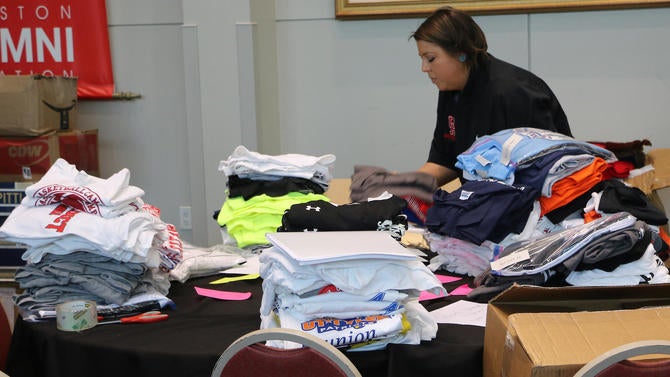
"When I started following it on Twitter, all of the response, to be perfectly honest with you, I got a little bit emotional on Tuesday and Wednesday when it went viral," Sampson said. "I saw the stories behind the story. Football teams and volleyball teams, lacrosse teams, cross country, track, conferences challenging conferences, states challenging states. It wasn't that long ago that we were going through Charlottesville and something that proved to be divisive. And then, all of the sudden, you go through something like Hurricane Harvey. And this little tweet that goes out, you see what this country is. You choose who you want to be. We're a country of neighbors.
"The reason you get into coaching in the first place is to help and develop, try to make people better. And then there's the competitive spirit, and I think all those attributes came out in this reaction to that tweet. It's been emotional, it's been inspiring, it's been uplifting, but at the end of the day, all those things are great, but people are here suffering and you don't lose sight of that."
The basketball program's response and measure of gratitude for this movement will last into the season. Sampson said plans haven't been finalized yet, but there are ideas in the works to recognize many people when it comes time to play games at Hofheinz Arena in November.
"It's not just the people that were affected by it," he said. "We're going to do a thing with the first responders. We had a policeman that lost his life trying to rescue people out of a flood area. Volunteers, you hear a lot about the Cajun Navy who drove over from Louisiana. We want to honor and acknowledge as many people as we can. There's a kindred spirit here with this, and we're constantly looking for ways to broaden our donation plan."
For Sampson, a man who has coached for nearly 40 years, he knows this event could wind up being the thing that defines both his time at Houston and the final coaching phase of his life. It went from an idea he hoped could get some coaches to donate a few goods and turned into one of the biggest charity movements in the midst of one of the greatest natural disasters in the history of the United States.







